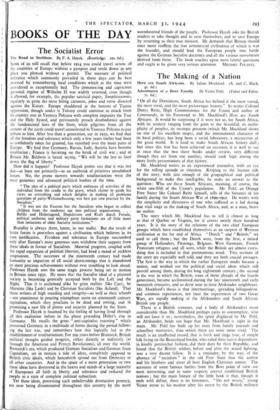BOOKS OF THE DAY
The Socialist Error
The Road to Serfdom. By F. A. Hayek. (Routledge. vas. 6d.)
SOME of us still recall that before 1914 you could travel across all the countries of Europe without a passport and settle down in any place you pleased without a permit. The measure of political tolerance which commonly prevailed in those days can be best assessed by remembering local conditions which at the time were considered as exceptionally bad. The domineering and capricious personal regime of Wilhelm II was widely resented, even though it allowed, for example, the popular satirical paper, Simplicissimw, regularly to print the most biting cartoons, jokes and verse directed against the Kaiser. Europe shuddered at the horrors of Tsarist oppression, though under it Tolstoy could continue to attack from his country seat in Yasnaya Polyana with complete impunity the Tsar and the Holy Synod, and persistently preach disobedience against the fundamental laws of the State, while pilgrims from all the corners of the earth could travel unmolested to Yasnaya Polyana to pay tribute to him. After less than a generation, say in 1935, we find that all the freedom and tolerance which only a few years earlier had been so confidently taken for granted, has vanished over the main parts of Europe. We find that Germany, Russia, Italy, Austria have become totalitarian ; France is hovering on the brink of civil war ; and in Britain Mr. Baldwin is heard saying, "We will be the last to haul down the flag of liberty."
How did it happen? Professor Hayek points out that it was not due—at least not primarily—to an outbreak of primitive unsubdued forces. No, the prune movers towards totalitarianism were the most generous and advanced political leaders of the time.
"The idea of a political party which embraces all activities of the individual from the cradle to the grave, which claims to guide his views on everything and which delights in making all problems questions of party-Weltanschauung, was first put into practice by the Socialists."
"It was not the Fascists but the Socialists who began to collect children from the tenderest age into political organisations . . . Balls and Hitlerjugend, Dopolavoro and Kraft durch Freude, political uniforms and military party formations are all little more than imitations of older Socialist institutions."
Brutality is always there, latent, in our midst. But the revolt of brute forces is powerless against a civilisation which believes in its own justification. Freedom and tolerance in Europe succumbed only after Europe's most generous sons withdrew their support from these ideals in favour of Socialism. Material progress, coupled with the rapid expansion of political liberties, had bred a mood of reckless utopianism. The successes of the nineteenth century had made humanity so impatient of all social shortcomings that it abandoned its most precious achievements without ever troubling td look ahead. Professor Hayek sees the same tragic process being set in motion in Britain since 1931. He notes that the Socialist ideal of a planned society is becoming generally accepted both by the Left and the Right That it is acclaimed alike by grim realists (like Carr), by Marxists (like Laski) and by Christian Socialists (like Acland). That these writers of high standing and integrity—as well as their schools —are unanimous in pouring triumphant scorn on nineteenth century capitalism, which they proclaim to be dead and rotting, and in promising a new life of plenty and security planned by the State.
Professor Hayek is haunted by the feeling of having lived through all this exaltation before in the phase preceding Hitler's rise in Germany. He recalls the great "anti-capitalist yearning" which possessed Germany in a multitude of forms during the period follow- ing the last war, and remembers how this logically led to the establishment of totalitarianism. For 200 years before Bismarck, British political thought guided progress, either directly or indirectly (as through the American and French Revolutions), all over the world. Bismarck's era, which produced German Socialism and German State Capitalism, set in motion a tide of ideas, completely opposed to British civic ideals, which henceforth spread out from Germany to all other countries. And in the space of a mere generation or two these ideas have destroyed in the hearts and minds of a large majority of Europeans all faith in liberty and tolerance and .reduced the People to a state of complete political subjection.
Yet these ideas, possessing such unbelievable destructive potency, are now being disseminated throughout this country by the most warmhearted friends of the people. Professor Hayek asks his British readers to take thought and to save themselves, and to save Europe by returning to their true mission. He demands that Britain should once more reaffirm the free commercial civilisation of which it was the founder, and should lead the European people into battle against the German Socialist doctrines and all the various movements derived from them. The book touches upon most fateful questions and ought to be given very serious attention. MICHAEL POLANYI.






















 Previous page
Previous page